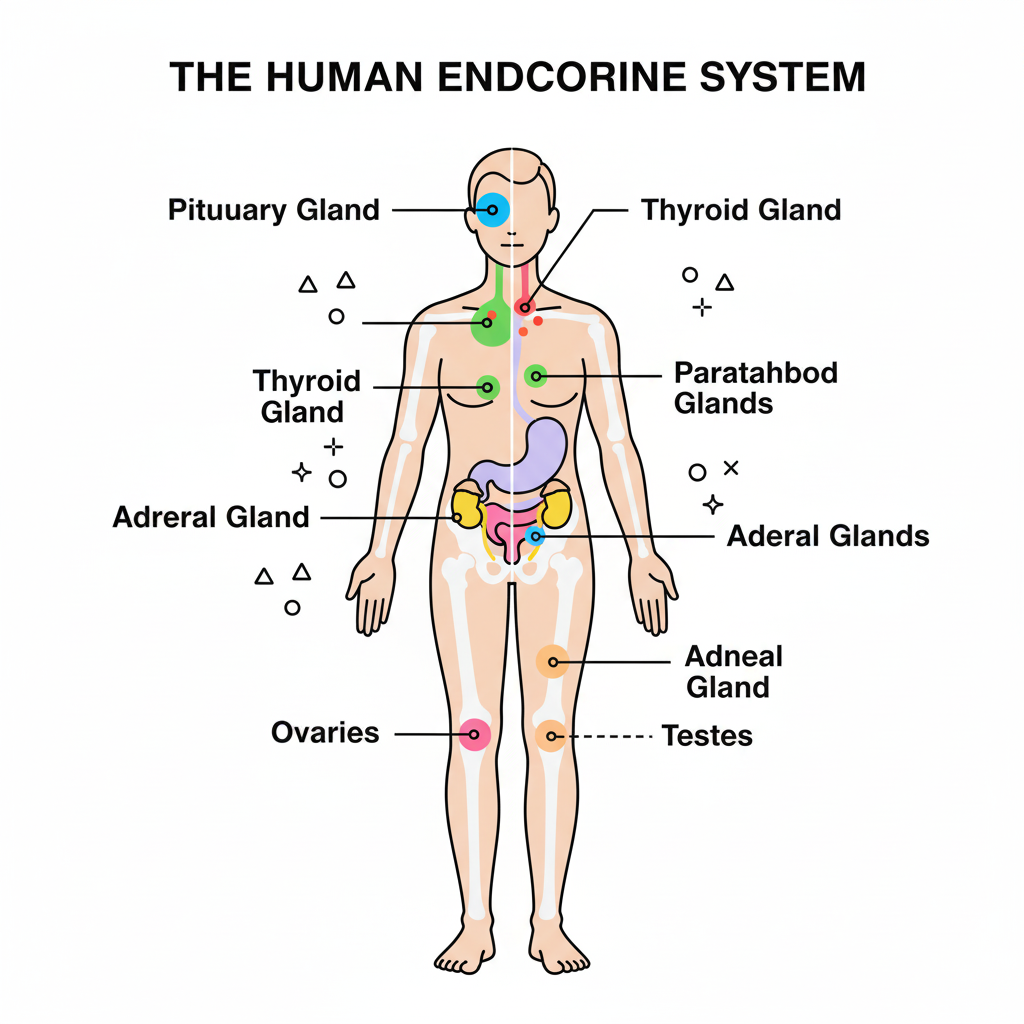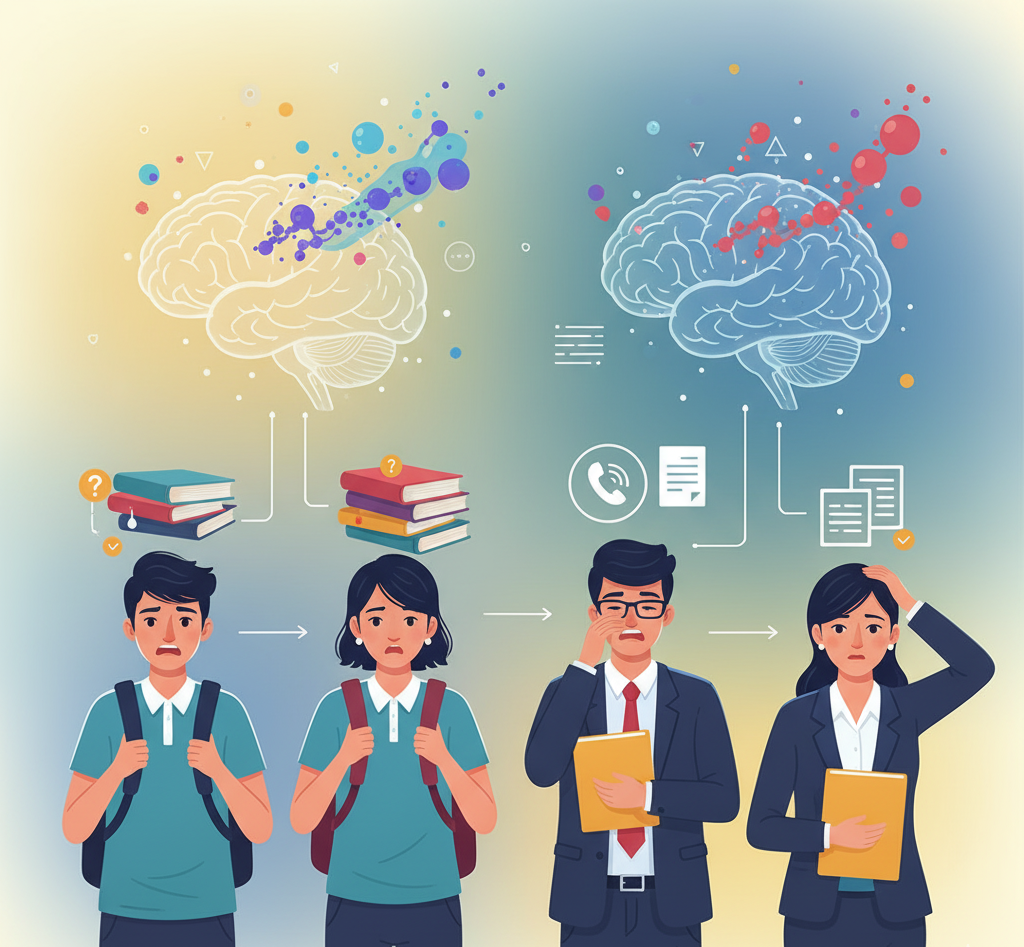Introduction
Learning is something we do every day — whether it’s studying for exams, learning a new language, improving work performance, or building new habits. But what controls our ability to learn? Until recently, scientists believed dopamine was the primary chemical responsible for motivation and reward-based learning.
Now, new discoveries in neuroscience reveal a deeper truth: hormones powerfully influence dopamine, affecting how quickly we learn, how motivated we feel, and how well we remember new information.
This new connection helps explain why learning feels easy at some times in life and difficult at others. It also sheds light on why stress, sleep, puberty, menstrual cycles, thyroid issues, and ageing impact brain health.
Let’s break down this exciting discovery in simple, patient-friendly language.

Understanding What Hormones Really Are
Hormones are natural chemicals made by glands in your body. They act like messengers, carrying signals to organs, muscles, and the brain. These substances shape your:
-
Mood
-
Focus
-
Motivation
-
Memory
-
Stress response
-
Sleep
-
Energy levels
-
Emotional balance
Key hormones that influence the brain include:
-
Cortisol (stress hormone)
-
Thyroid hormones (energy, memory, attention)
-
Estrogen & progesterone (learning, emotional balance)
-
Testosterone (motivation, confidence)
-
Insulin (brain fuel regulation)
-
Oxytocin (trust, bonding, emotional learning)
Because hormones travel everywhere in your bloodstream, even slight imbalances can change how your brain learns and processes information.
Understanding Dopamine: The Brain’s Reward Chemical
Dopamine is a neurotransmitter — a chemical that allows brain cells to communicate. It plays a major role in:
-
Learning new skills
-
Developing habits
-
Reward and pleasure
-
Memory formation
-
Motivation and drive
-
Attention and focus
-
Motor skills
When dopamine levels are balanced, learning becomes easy, and motivation feels natural.
When dopamine is low, you may feel:
-
Low mood
-
Poor concentration
-
Lack of energy
-
Difficulty starting tasks
-
Slow learning
-
Low confidence
This is why understanding dopamine is essential for anyone trying to improve brain performance.
The New Scientific Discovery: Hormones Shape Dopamine — And Learning
For years, researchers did not fully understand why learning ability varies during stress, puberty, menstrual cycles, sleep changes, and thyroid problems.
Recent breakthroughs now confirm:
Hormones directly influence dopamine production, release, and sensitivity.
Here’s how the connection works:
1. Hormones increase or decrease dopamine levels
For example:
-
High estrogen boosts dopamine → improves learning and memory
-
High cortisol reduces dopamine → makes learning harder
-
Low thyroid hormones lower dopamine → causes brain fog
-
Balanced testosterone improves motivation and focus
2. Hormones change how brain cells respond to dopamine
Even normal dopamine levels won’t work properly if hormone signals are weak.
3. Hormones influence reward-based learning
Dopamine makes you feel rewarded when you succeed. Hormones decide how strong that reward feels.
4. Hormones control brain plasticity
Plasticity is your brain’s ability to form new connections.
Strong hormonal balance = faster learning.
Why This Discovery Matters for Students, Professionals, and Parents in India

This finding helps explain many everyday issues like:
-
Why students struggle to focus during stress
-
Why women experience learning changes during menstrual cycles
-
Why thyroid problems cause brain fog
-
Why teenagers learn differently during puberty
-
Why sleep deprivation weakens memory
-
Why older adults learn more slowly
-
Why hormonal imbalance affects mental health
It also helps doctors and psychologists understand learning disorders better, improving treatment and support.
How Stress Hormones Affect Dopamine and Learning
Stress triggers cortisol, a hormone that keeps you alert in emergencies.
But chronic stress — very common among Indian students and employees — can cause:
-
Lower dopamine
-
Reduced motivation
-
Poor memory
-
Difficulty concentrating
-
Slow learning
-
Reduced creativity
This is why exam pressure, workplace burnout, and financial stress affect your ability to learn and perform well.
How Thyroid Hormones Shape Learning and Brain Health
India has a high prevalence of thyroid disorders, especially among women.
Low thyroid hormones can cause:
-
Brain fog
-
Poor concentration
-
Forgetfulness
-
Slow processing
-
Low dopamine
-
Fatigue
High thyroid hormones can cause:
-
Anxiety
-
Restlessness
-
Difficulty focusing
Balancing thyroid levels significantly improves dopamine activity and learning performance.
ALSO READ: Food And Flu Season
How Female Hormones Influence Learning
Estrogen and progesterone levels fluctuate during:
-
Menstrual cycles
-
Pregnancy
-
Perimenopause
-
Menopause
Estrogen boosts dopamine and enhances learning.
Progesterone sometimes slows down dopamine responses.
This explains:
-
Mood swings
-
Changing focus
-
Memory variations
-
Emotional sensitivity
-
Different learning performance during the cycle
Understanding this helps women plan productive days around their natural rhythms.
How Testosterone Affects Motivation and Confidence
Balanced testosterone improves:
-
Risk-taking
-
Confidence
-
Motivation
-
Focus
-
Goal-driven behavior
Low testosterone (common in men above 40) can cause:
-
Low motivation
-
Reduced interest in learning
-
Poor concentration
-
Mood issues
Balanced levels improve dopamine function.
Lifestyle Habits That Improve Hormone Balance and Learning
You can naturally improve hormone balance and dopamine with daily habits.
Food
-
Eggs
-
Nuts
-
Milk and paneer
-
Whole grains
-
Bananas
-
Dark chocolate
-
Green leafy vegetables
-
Omega-3 rich foods (fish, flaxseed)
Exercise
-
Brisk walking
-
Strength training
-
Yoga
-
Dancing
All of these increase dopamine and improve hormone balance.
Sleep
7–9 hours of good sleep helps your brain produce dopamine and repair hormonal systems.
Stress management
-
Meditation
-
Breathing exercises
-
Journaling
-
Spending time in sunlight
Medical support
If symptoms persist, doctors may evaluate:
-
Thyroid levels
-
Blood sugar
-
Vitamin B12 & D
-
Reproductive hormones
When to See a Doctor
Seek medical help if you notice:
-
Persistent brain fog
-
Difficulty learning new things
-
Memory issues
-
Unexplained fatigue
-
Mood swings
-
Sudden loss of motivation
-
Irregular periods
-
Sleep disturbances
-
Rapid weight changes
-
Anxiety or stress symptoms
-
Symptoms of thyroid imbalance
Doctors can check hormone levels, suggest treatment, and guide lifestyle changes.
Possible Risks and Complications of Untreated Hormonal Imbalance
Ignoring symptoms may lead to:
-
Depression or anxiety
-
Learning difficulties
-
Severe memory issues
-
Major thyroid disorders
-
Infertility
-
Chronic fatigue
-
Poor academic/work performance
-
Long-term stress-related illness
Timely diagnosis prevents complications.
Conclusion
The new discovery linking hormones, dopamine, and learning is a major milestone in neuroscience. It confirms what many people feel but couldn’t explain — stress, thyroid issues, menstrual cycles, and lifestyle habits deeply affect our ability to learn, focus, and stay motivated.
By balancing hormones through healthy habits and medical support, you can significantly improve:
-
Learning speed
-
Memory power
-
Emotional well-being
-
Motivation
-
Confidence
Take charge of your brain health today — small changes create big results.
50 FAQs
1. How do hormones affect learning?
They influence dopamine, which controls memory, focus, and motivation.
2. What is dopamine?
A brain chemical responsible for reward, motivation, and learning.
3. Can stress reduce learning ability?
Yes, high cortisol lowers dopamine and weakens memory.
4. Do thyroid problems affect brain function?
Yes, they cause brain fog, slow thinking, and poor focus.
5. Why do I forget things easily?
Sleep issues, stress, or hormonal imbalance may be the reason.
6. Does diet impact dopamine?
Yes, protein-rich and omega-3 foods help.
7. Can exercise improve learning?
Absolutely — it boosts dopamine and brain plasticity.
8. Does lack of sleep reduce dopamine?
Yes, it disrupts both hormones and neurotransmitters.
9. Why do women experience learning changes?
Estrogen and progesterone shifts affect the brain.
10. Can dopamine imbalance cause low motivation?
Yes, it directly reduces drive and interest.
11. Is dopamine the same as adrenaline?
No, they are different brain chemicals.
12. Can meditation boost dopamine?
Yes, it reduces stress and improves brain chemistry.
13. Does puberty affect learning?
Yes, hormonal changes reshape the brain.
14. Can menopause affect memory?
Yes, due to reduced estrogen.
15. Do hormones affect confidence?
Yes, especially testosterone and estrogen.
16. What foods help boost dopamine?
Bananas, almonds, eggs, dark chocolate.
17. Are dopamine supplements safe?
Only if prescribed by a doctor.
18. Can drinking coffee increase dopamine?
Temporarily, yes.
19. Does screen time affect dopamine?
Excessive screen time may reduce natural dopamine sensitivity.
20. Can hormonal imbalance cause anxiety?
Yes, hormones regulate mood.
21. Do learning problems always mean a disorder?
Not necessarily — stress or hormones may be the cause.
22. Can blood tests check hormone levels?
Yes, including thyroid, reproductive, and stress hormones.
23. Is dopamine related to addiction?
Yes, it drives reward-seeking behavior.
24. Why do I feel unmotivated?
Possible dopamine imbalance or stress.
25. Can iron deficiency affect learning?
Yes, it affects brain oxygen supply.
26. Does B12 deficiency cause memory issues?
Yes, very common in India.
27. Can obesity affect hormones?
Yes, it increases insulin resistance.
28. Can dehydration affect brain function?
Yes, it reduces focus and clarity.
29. Does dopamine help in studying?
Yes, it improves focus and motivation.
30. Can dopamine be increased naturally?
Yes — exercise, sunlight, food, sleep.
31. Are hormones responsible for mood swings?
Yes, especially cortisol and estrogen.
32. Can learning ability change with age?
Yes, hormones and dopamine reduce slightly.
33. Does sugar affect brain health?
Too much sugar destabilizes hormones and dopamine.
34. Can menstrual cycles affect study performance?
Yes, due to hormonal shifts.
35. Does fasting affect dopamine?
It may temporarily increase it.
36. Can yoga improve memory?
Yes, it reduces cortisol.
37. Is dopamine linked to happiness?
Partly — many chemicals influence mood.
38. Do medicines affect dopamine?
Some can increase or decrease it.
39. Can childhood stress impact learning later?
Yes, long-lasting hormonal effects.
40. Does gut health influence hormones?
Yes, gut bacteria affect brain chemicals.
41. Can alcohol affect dopamine?
Yes, it disrupts natural dopamine production.
42. Are dopamine levels higher in teens?
Yes, leading to more risk-taking.
43. Can hormone therapy improve learning?
Only when medically needed.
44. Does dopamine improve creativity?
Balanced dopamine supports creativity.
45. Can hormones cause irritability?
Yes, when imbalanced.
46. Do late-night study habits affect hormones?
Yes, poor sleep disrupts dopamine.
47. Can brain training apps improve learning?
They help, but hormones must be balanced too.
48. Can hormonal issues cause depression?
Yes, common with thyroid or postpartum changes.
49. Is dopamine related to ADHD?
Yes, reduced dopamine activity is involved.
50. When should I consult a doctor?
If learning, memory, mood, or energy problems persist.
Quickobook CTA
Need help with memory problems, stress, thyroid issues, or hormonal imbalance?
Find top neurologists, endocrinologists, and general physicians near you on Quickobook.
Book appointments online, compare fees, read reviews, and choose the right specialist easily.
Your brain health matters — get expert help with Quickobook today.
Disclaimer
This blog is for educational purposes only. It does not replace medical advice, diagnosis, or treatment. Always consult a qualified doctor for personalised care and guidance.









Comments (0)
No comments yet. Be the first to share your thoughts!
Leave a Comment